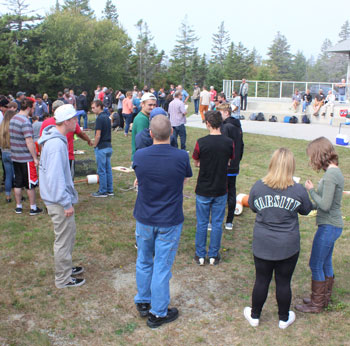Eastern Maine Skippers Working to Manage and Restore Local Fisheries
by Paul Molyneaux

Eastern Maine Skippers Program students gathered outside the Schoodic Institute in Winter Harbor on September 26, 2017. The eight high schools in the program all meet twice annually to exchange ideas and develop group marine related academic projects. Fishermen’s Voice photo
Following the Eastern Maine Skippers Program kick-off cohort day on September 26, students have begun looking at topics for projects that will address the question: “How can individuals and communities manage and restore local fisheries?”
Students from the eight schools that participate in EMSP are investigating a number of topics, including bait issues, access to fisheries besides lobsters, whale entanglement, scallop aquaculture, impacts of cruise ships, student lobster licenses, the future of the shrimp fishery, clam management, and more.
Besides focusing on big issues like bait availability and fisheries access, Jonesport Beals High School (JBHS) students participated in a workshop on refrigeration presented by Bernie Cecire of ECR Refrigeration in Eastport. Considering the importance of refrigeration in the seafood industry and the increasing use of refrigerated sea water systems on many new boats, knowledge of how these machines work and how to keep them running could come in handy. Students at JPBHS turned a broken aquarium chiller into a learning experience as Bernie showed them how it worked and suggested improvisational repairs. “Still,” he said, “maybe you should just get a new one.”
Students at Narraguagus High School (NHS) have discussed several issues, including gaining access to groundfish by acquiring Handgear B permits, which are free. They have also discussed the upcoming scallop license lottery, and various fisheries that remain open access. Dwight Carver, a Jonesport lobsterman and member of NOAA’s Large Whale Take Reduction Team, visited the class to talk about whale entanglements and what the lobster industry was doing to reduce interactions.
Other NHS students are looking into the possibility of setting shrimp traps in an effort to explore the potential of that fishery in Downeast waters. Dwight Carver spoke to them about the history of shrimping in the Jonesport area. “They did it for a few years in the late 60’s,” he said. “My father rigged up with homemade doors and a little net. The shrimp were here for a little while and then they were gone.”
Students at MDI have talked to members of the local cruise ship committees to gain a better understanding of the effects cruise ships might be having on their communities and local fisheries. They have also been introduced to a cruise ship spokesperson. Out on the islands of Vinalhaven and North Haven, students are also exploring the issue of whale entanglements, as well as lobster fishery access and aquaculture. David Morin, who heads NOAA’s Large Whale Take Reduction Team, is preparing a presentation for students that will be available in early September.
At George Stevens Academy, students met with Sarah Modranal of the Downeast Salmon Federation, to learn about seining for fish and river restoration. At Deer Isle Stonington High school and Ellsworth High School, students are considering the above issues, and others.
As most classes hone in on areas of deeper research, the EMSP team does all it can to provide teachers and student with resources to make their study more rewarding. In the coming months, Christina Fifield of the Maine Center for Coastal Fisheries, which runs the Eastern Maine Skippers Program in partnership with Rural Aspirations Project and others, will be circulating in EMSP communities and meeting with business owners who want to help support this valuable program. Contact: cfifield@coastalfisheries.org
